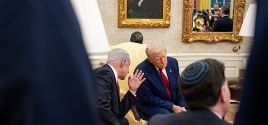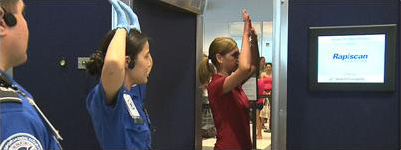Security Theater Adds a New ActComing soon: The Interview.by Wendy McElroy Aug. 04, 2011 |
Popular 
Ben Shapiro, Mark Levin and Laura Loomer Warn of Foreign Influence... From Qatar

NYT: Trump Ended War With Houthis After They Shot Down U.S. Drones, Nearly Hit Fighter Jets

Trump Advisor to Washington Post: 'In MAGA, We Are Not Bibi Fans'

Eloy Adrian Camarillo, 17, Arrested in Shooting Death of Infowars Reporter Jamie White

Trump Cut Off Contact With Netanyahu Over 'Manipulation' Concerns, Israeli Reporter Claims
  “Where are you going? What is the purpose of your trip? Where will you be staying? Who will you see there? How do you know them?” Anyone familiar with international travel will recognize such questions as a particularly unpleasant aspect of being “processed” by U.S. Immigration and Customs Enforcement (ICE). Soon Americans traveling within their own country may be similarly quizzed before being allowed on an airplane. “Where are you going? What is the purpose of your trip? Where will you be staying? Who will you see there? How do you know them?” Anyone familiar with international travel will recognize such questions as a particularly unpleasant aspect of being “processed” by U.S. Immigration and Customs Enforcement (ICE). Soon Americans traveling within their own country may be similarly quizzed before being allowed on an airplane.The Transportation Security Administration (TSA) is debuting a new behavior detection technique, which may be announced as early as this month. TSA agents plan to “chat you up” … or maybe they will interrogate you under sweat-inducing spotlights. TSA Administrator John Pistole declined to discuss the details but as Politico commentator Josh Gerstein explained, “Pistole said TSA is preparing to move to an approach that employs more conversation with travelers — a method that has been employed with great success in Israel.” The information comes from a recent Aspen Security Forum in Colorado, where Pistole conducted an onstage interview with CNN’s Jeanne Meserve. Pistole stated, “I’m very much interested in expanding the behavior detection program … in a way that allows us to … have more interaction with a passenger just from a discussion which may be able to expedite the physical screening aspects.” When Meserve explicitly asked whether the Israeli system was “the model,” Pistole answered, “Yes,” and later explained that Israeli security techniques had been “carefully examined” because they have been “very effective.” (See the video here. It runs for 62:39 minutes; the reference quotes begin at about 18 minutes.) Israeli Security Extensive questioning of travelers is a mainstay and defining aspect of Israel’s airport security. In a Time article, “The Toughest Airline Security of All,” Lisa Beyer chronicled her own experience in Israeli airports: The point of the long question sessions is to find inconsistencies in a terrorist’s cover story, or to agitate him into a panic. I was typically asked questions like: who paid for your ticket, why are you traveling, why did you buy the ticket so late (or so early), where did you travel in Israel, whom did you meet here…. Almost always, I’d be questioned by one agent, who would then leave to consult with a second agent, who would appear and ask many of the same questions. Then the two would compare notes, often with a supervisor, before the first agent would return with more questions.Currently, about 3,000 Behavior Detection Officers (BDOs) are stationed throughout the United States at 161 airports. They observe travelers for involuntary reactions, such as sweating, that supposedly identify high security risks who require more intensive screening. It is not clear whether an expanded number of BDOs or regular TSA agents will quiz travelers. Three things seem clear, however. First, if an Israeli model is adopted, more time will be needed to clear airport security. According to Wikipedia, El Al Israel Airlines requires that each individual be interviewed. Thus “passengers are asked to report three hours before departure.” Interviewing every passenger may be a practical impossibility at American airports, but even interviewing 10 percent would cause substantial delay. Second, the TSA wants to distance itself from patdowns of children, which have been called “child molestation” and have outraged the public. “I think under our new protocols we would see very few patdowns of children,” Pistole said. Instead, Politico’s Gerstein reported, parents would be “more involved” with TSA personnel in figuring out “why a child is setting off alarms.” Third, any change in screening children will not necessarily extend to other travelers. Pistole specifically addressed the elderly, whom the TSA is also accused of “man-handling.” He called their screening more complicated because so many of them are on lists that trigger enhanced screening. Orwellian Changes Major changes at the TSA will affect every flyer in America. Several test programs are being instituted or planned. Some seem innocuous, such as a program to identify frequent flyers and expedite their screening. Others seem Orwellian, such as “Future Attribute Screening Technology,” which scans passengers for indications of their intent to commit future crimes. For example, a passenger with a speeding heartbeat or the “wrong” attitude could be considered a high risk and subjected to enhanced screening. Putting aside issues of civil liberty and money, does the TSA’s track record justify such expansion? The Department of Homeland Security’s Office of the Inspector General report (pdf) for FY 2011 said that some 43,000 people have been given enhanced screening since 2006. In 3,100 cases the TSA called the police for further handling. A total of 278 people were arrested, all on nonterrorist charges such as immigration violations. Either the TSA either cannot detect terrorists or there are none to be found. The one task at which the TSA excels, however, is the imposition of social control by training the average person to obey. How will the American people respond to being quizzed? I suspect they will answer promptly and politely in the same way they take off shoes, present their possessions for rifling, and submit to x-rays and patdowns. Over time and through gradual steps the TSA has conditioned Americans to view each other as “the enemy” from which government must provide protection. |



